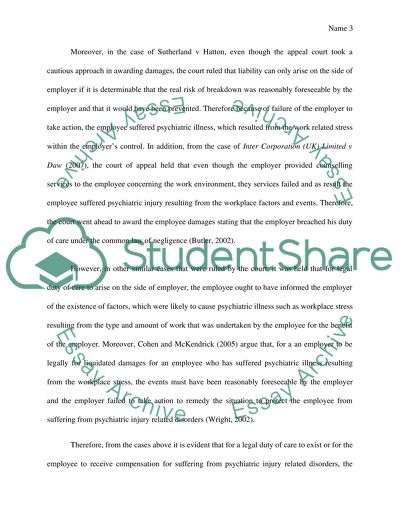Cite this document
(“Critically evaluate, in relation to the common law duty of care, the Essay - 22”, n.d.)
Critically evaluate, in relation to the common law duty of care, the Essay - 22. Retrieved from https://studentshare.org/law/1669597-critically-evaluate-in-relation-to-the-common-law-duty-of-care-the-liability-of-employers-for-psychiatric-illnesses-suffered-by-employees-and-arising-as-the-result-of-employees-being-made-to-work-under-stressful-conditions
Critically evaluate, in relation to the common law duty of care, the Essay - 22. Retrieved from https://studentshare.org/law/1669597-critically-evaluate-in-relation-to-the-common-law-duty-of-care-the-liability-of-employers-for-psychiatric-illnesses-suffered-by-employees-and-arising-as-the-result-of-employees-being-made-to-work-under-stressful-conditions
(Critically Evaluate, in Relation to the Common Law Duty of Care, the Essay - 22)
Critically Evaluate, in Relation to the Common Law Duty of Care, the Essay - 22. https://studentshare.org/law/1669597-critically-evaluate-in-relation-to-the-common-law-duty-of-care-the-liability-of-employers-for-psychiatric-illnesses-suffered-by-employees-and-arising-as-the-result-of-employees-being-made-to-work-under-stressful-conditions.
Critically Evaluate, in Relation to the Common Law Duty of Care, the Essay - 22. https://studentshare.org/law/1669597-critically-evaluate-in-relation-to-the-common-law-duty-of-care-the-liability-of-employers-for-psychiatric-illnesses-suffered-by-employees-and-arising-as-the-result-of-employees-being-made-to-work-under-stressful-conditions.
“Critically Evaluate, in Relation to the Common Law Duty of Care, the Essay - 22”, n.d. https://studentshare.org/law/1669597-critically-evaluate-in-relation-to-the-common-law-duty-of-care-the-liability-of-employers-for-psychiatric-illnesses-suffered-by-employees-and-arising-as-the-result-of-employees-being-made-to-work-under-stressful-conditions.


